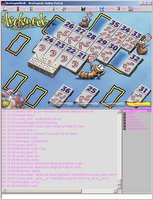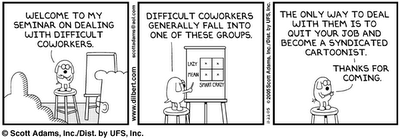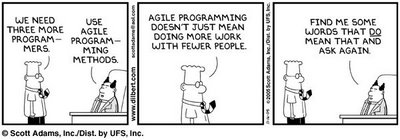I am very fond of European movies. They always provide me some insight, or perhaps I have seen too many American movies. European movies seem to let me see the world in a different angle, and often comes with an intoxicating beauty. Girl with a Pearl Earring was one of this kind. Also supported by Pathé and the UK Film Council is Millions, a movie directed by Danny Boyle (Trainspotting, 28 Days Later).
The story is very simple, so simple that you probably guessed the ending right after reading the synopsis. However, I must also add that a movie is not a puzzle, so a good script need not (or rather, should not) be complex...
Damian is a young British kid, about the age of 7. After her mother died, he was moving to a new community with his father and his older brother Anthony. Damian was still mourning for the loss of his mother, and he attempted to soothe his own sorrow by imagining her as a saint in heaven. A few days before Christmas, a hugh bag of money fell from the sky. Damian thought it was god who gave him the money. Well educated by his mother, he tried to distribute the money to the poor people, but his brother thought it was a better idea to keep the money to themselves. However, by Christmas the transition to Euro would be complete and any unused British Pounds will be useless. They also have another problem: the money did not come from god. It came from a train robbery.
This simple movie talked about lots of things. What do you get probably depend on what you were thinking at that time. Money is very important in our lives, but should they be? "Money makes it harder to see what is what." More than often, money clouds our judgement costs our children's innocence. Anthony hadn't celebrated his 10th birthday but he is already well-versed in Economy. He knows the exchange rate better than his father. He exploits the death of his mother to get benefits from adults, and is surfing on the Internet for underwear advertisement. Is this what kids are supposed to do?
Damian's saints gave a couple of very refreshing talks. Saint Peter's reinterpretation of the "five loaves and two fish" story might be one of them: Jesus passed the plate to one of his followers. The follower did not take the food, because he had some lamb chops hidden beneath his clothes. Instead he placed some of his lamb on the plate and pretended he took something. Each of the followers did the same, and Jesus himself was astonished when he found the fish and loaves still intact on the plate when it was passed back to him. Saint Peter lied to Jesus and told him it was a miracle. It was not magical. It was sharing out of good faith, but perhaps it was still a miracle. As was what Damian did.
There are more to the movie than what I have written but I believe it is better if I do not spoil you too much before you get a chance to see it. This fairy tale is now showing on selected UA cinemas in Hong Kong.
Impressions on Millions: (first ever) 10/10
You may also find some information from other reviews on the net:
Millions at Rottontomatoes
KDHX Film Review - Millions
Millions is worth the buck
Someone shared similar thoughts too! 爛兔記:電影觀眾不是尊貴客戶
Sunday, November 27, 2005
"Money is just a thing, and things change"
Posted by
hokuto
at
23:21
2
comments
![]()
Labels: movie
Wednesday, November 23, 2005
猛龍
昨天總算有時間看電影,首先當然要看很快會落畫的。於是我看了有洪金寶的猛龍。
(注意:有內容)
不知怎的,總覺得看起來很有點過江龍(Martial Law)的影子。劇情方面比較老土,對白是四語廣播(有點多餘),而且有很多漫畫式的人物介紹、回想…但看動作片最主要還是看動作。而錢嘉樂做武指出來的效果還算不錯!電影中段的槍戰跟片尾的刀手格鬥都很可觀,但我覺得片尾吳建豪的槍戰與最後一幕『射鴨仔』是敗筆!
下一套會看的可能是殺破狼。猛龍評分:5.5/10
Posted by
hokuto
at
23:57
6
comments
![]()
Labels: movie
Monday, November 21, 2005
Do you do things right?
Recent events often remind me to an old story from Fast Company magazine. It talked about the reason why LEGO® failed in the 21st century, but as usual, my brain, being a renegade, have a different impression of the story.
Godtfred Kirk Christenson said, "If we do all things right, the profit will come." From the writer's perspective, what was right 50 years ago is probably no longer valid now. The society is constantly changing, so one must constantly revise her strategies, or she will face defeats like Lego did in the late '90s. However we can always read things from another angle. This can probably tell us why some industries never make a big profit: If you intentionally or unintentionally rip off customers, and hope that they do not notice or complain, you deserve bad profitability. Talking about profit, revenue, or market place will not bring you to victory. It will only lead you to the end of it.
It is up to you to discover what the legacy of this danish company could tell us. To the original article: Why Can't Lego Click?
Posted by
hokuto
at
02:31
1 comments
![]()
Labels: work
Saturday, November 19, 2005
今天的神奇午飯
我叫了:
冬蔭功湯金邊粉跟蝦餅、豬頸肉,三色冰。
結果來的是:
清湯檬粉跟蝦餅,椰汁冰。
真的要…囧rz
Posted by
hokuto
at
13:56
0
comments
![]()
Labels: gluttony
Friday, November 18, 2005
Thursday, November 17, 2005
Pickomino
Imagine that you are at a chicken BBQ party, and you need to get some roasted worms for your chicken (yuck). Your goal is to get more worms than everyone else...
Pickomino (also known as Heckmeck am Bratwurmeck) is a small dice game designed by Reiner Knizia, published by Zoch Verlag and Rio Grande Games. It is a little push-your-luck dice game, where you are given 8 special dice when your turn comes. Each time you roll your dice you have to keep all the dice showing one (and only one) of the 6 numbers of which you do not yet have. If you roll a sum of 21-24 you get to keep one of the 1-worm tiles. 25-28, 2 worms, 29-32, 3 worms, 33-36 voila, you get 4 worms at once! If you happen to roll the exact amount someone did, you get his/her worms instead. On the left is the BSW interface of Pickomino. That was a 4-player game. Unlucky day for me! In the first round someone took the 4-worm tile for 36. Surprisingly, I won that game.
On the left is the BSW interface of Pickomino. That was a 4-player game. Unlucky day for me! In the first round someone took the 4-worm tile for 36. Surprisingly, I won that game.
In a glance the game looks very very simple, but after playing a few games online I begin to realize there are lots of decision to make. What do you do when you are lagging behind? The game will end when all the "public" tiles are gone, so you sometimes have to pick an opponent's tile just to prevent the game from ending too soon. That in turn means you have to engineer your dice results to match exactly one of the opponents' face up tiles. No, it is not a game where you roll the dice and hope for the best. Luck plays an important part, but it also requires you to find a strategy and pick your dice so that your strategy work. I would definitely get a copy if it were cheaper.
Posted by
hokuto
at
01:51
1 comments
![]()
Labels: game:board
Merkel’s marriage of inconvenience
Some updates to Germany at the Economist.
Merkel’s marriage of inconvenience
Nov 14th 2005
From The Economist Global Agenda
Almost two months after Germany’s inconclusive election, the proposed “grand coalition”, with Angela Merkel as chancellor, has been approved by the country’s three main parties. But their agreed programme of government is an awkward compromise and may do little to revive Europe’s largest economy
GERMAN media reports say that in recent days, leaders of the country’s three main parties have taken to addressing each other by the familiar “du” form. After weeks of stormy negotiations on a proposed “grand coalition” of centre-right and centre-left, which at several points seemed about to collapse, this was progress. At the end of last week, the improved atmosphere in the talks meant that the leaders of the Christian Democrats (CDU), Christian Social Union (CSU) and Social Democrats (SPD) could finally reach agreement on a programme of government. And on Monday November 14th, congresses of each of the three parties gave their strong approval to the deal. The question is, how long will the bonhomie last once the former rivals have to make the difficult decisions needed to revive Europe’s largest economy?
Under the deal, Angela Merkel, the CDU’s leader, will become Germany’s first woman chancellor—and its first from the former East Germany—while the SPD’s Peer Steinbrück, a former premier of North Rhine-Westphalia, will be finance minister. The parties have agreed that, to bring the country’s large budget deficit under control, taxes will rise. However, there will be only modest labour-market reforms, even though Germany urgently needs more of these to bring down its alarming unemployment rate—currently 11.6%.
A fortnight ago, the coalition talks seemed on the brink of collapse, following the resignation of Franz Müntefering as the SPD’s chairman. He quit after his party’s executive committee rejected his candidate for the SPD’s number two position. This prompted the leader of the Bavarian-based CSU, Edmund Stoiber, to declare that he no longer wanted to be economics minister in the new government. A carefully stitched deal to build a three-party cabinet suddenly looked like coming apart.
But things were soon patched up after Matthias Platzeck, the highly regarded premier of Brandenburg state, was nominated to succeed Mr Müntefering as SPD chief, and Michael Glos, the CSU’s parliamentary leader, took Mr Stoiber’s seat in the proposed cabinet as economics minister. Mr Müntefering, despite giving up his party role, still looks likely to become vice-chancellor and labour minister.
The programme of government thrashed out by the three parties runs to hundreds of pages. Overall it is a compromise, and not a very good one, between proposals the CDU/CSU and the SPD had presented in September’s election. On some matters, such as reform of Germany’s federal system, it goes into great, perhaps excessive, detail. But it is disappointingly thin on such vital matters as reforming the labour market and health system. In one area where it does go into specifics—planned increases in tax—it has caused dismay among business leaders, who fear the package may damage Germany’s anaemic economy instead of reviving it, as intended. They are particularly annoyed at the CDU, which had talked of tax cuts, not rises, in its election campaign.
To try to reduce the government’s budget deficit to 3% of GDP or less—as laid down in the widely flouted rules for countries in the euro currency area—there will be increases in both the value-added sales tax (VAT) and in income taxes. The VAT rate will rise from 16% to 19%, while (at the SPD’s insistence) the top rate of income tax, for those earning over €250,000 ($290,000) a year, will rise from 42% to 45%. Those on lower incomes will suffer the loss of several tax breaks; and workers will also have to make slightly higher contributions towards state pensions.
Businesses will gain a modest cut in their social-security contributions and a little more flexibility in hiring and firing: in future, new employees will undergo a two-year probationary period before gaining job security, instead of six months, as is typically the case now. But these small concessions that Ms Merkel has wrung out of the SPD fall far short of what many business leaders believe are needed to liberate Germany’s labour market and thus encourage firms to create jobs. And they do not compensate for the negative effects businesses expect from the tax rises.
The German economy is expected to grow by just 0.8% or so this year and the government’s panel of economic advisers predicted recently that next year’s growth might be no more than 1%. The threat of tax rises the year after seems likely to make gloomy German consumers tighten their belts even further. Thus a fiscal squeeze without structural reforms may simply push the economy back into recession, making it harder, not easier, to close the budget gap.
Although the grand coalition will nominally enjoy a crushing majority of over 280 seats in parliament, it is still unclear how closely the new government will follow its programme after taking office, on November 22nd. No such coalition of left and right has been tried since a short-lived and not terribly successful attempt in the 1960s, in what was then West Germany. The big policy differences between the parties mean the agreement may not last: the CDU had wanted more ambitious reforms of the labour market; the SPD had wanted to spend its way out of economic stagnation instead of bringing the deficit under control.
More important than what is written in their policy programme is whether the traditional rivals can build the trust that is needed to govern a country badly in need of a new direction. Only time will tell if they can. If the coalition does fall apart, fresh elections may have to be called. This could in theory lead to a clearer outcome, in which the CDU and CSU would form a more coherent, and reformist, government in coalition with the smaller, market-friendly Free Democrats. But it could just as easily drive voters away from the mainstream parties into the arms of more hardline parties to their left and right.
Posted by
hokuto
at
01:01
3
comments
![]()
Labels: news
Tuesday, November 15, 2005
Antique discovery, part 1
Digging into age-old rubbish of an old woman, you will never know what you can find. I recently moved house and there in the old home I found lots of things my oma stockpiled, some of which more than 20 years old. An old supermarket shopping bag which I thrown away after having it photographed. From what I found inside it is probably from the 70s or 80s. Do you recognize the brands promoted on the bag? I don't. Searching on the Internet, those brands still exist, but they are probably no longer available in Hong Kong. KWV Brandy is produced by KMV International, a South African Company. Hungry Jack is an American firm selling pancake materials. Local supermarkets may still stock them, but I do not make pancakes so I am not sure.
An old supermarket shopping bag which I thrown away after having it photographed. From what I found inside it is probably from the 70s or 80s. Do you recognize the brands promoted on the bag? I don't. Searching on the Internet, those brands still exist, but they are probably no longer available in Hong Kong. KWV Brandy is produced by KMV International, a South African Company. Hungry Jack is an American firm selling pancake materials. Local supermarkets may still stock them, but I do not make pancakes so I am not sure.
More to come when I unpack the stuff...
Posted by
hokuto
at
11:39
4
comments
![]()
Labels: personal
Monday, November 14, 2005
Corpse Bride
Tim Burton's creations always intrigue me in a bizzare way. Yesterday I finally had time to go for Corpse Bride, his newest movie.
The story is based on a Russian folklore. Victor the shy kid was forced to marry the young and beautiful Victoria, the daughter of a declining family. They fell in love immediately after seeing each other, but there is always something waiting to go wrong. After make a mess out of the rehearsal, Victor went for a little practice in the dark forest at night, and accidentally married Emily, the corpse bride.
Like the rest of Tim Burton's movies, the world we see is so different from the world we live in, yet it reminds us continuously of your very own life. In the story he portrayed two worlds. The land of the living is dull and without colour with people all living like zombies and working like robots. The land of the dead is however very colourful, with the dead having an happy (after)life underground, singing and dancing every day and night.
[minor spoiler alert]
Some say that the story ended abruptly, but the final scene was so beautiful it made me weep. I wonder if the butterfly was the afterlife of another beautiful lady?
Impressions on Corpse Bride: 9/10
The songs are very nice, making the soundtrack a must-buy item. Following is an excerpt from "Tears to shed", a song Emily sang with the black widow and the maggot:
If I touch a burning candle I can feel no pain
In the ice or in the sun it's all the same
Yet I feel my heart is aching
Though it doesn't beat it's breaking
And the pain here that I feel
Try and tell me it's not real
I know that I am dead
Yet it seems that I still have some tears to shed
Posted by
hokuto
at
00:08
0
comments
![]()
Labels: movie
Saturday, November 12, 2005
Funny mascots
I keep seeing brilliant pieces of artwork recently.
Olympics
Above is the mascot for the 29th Olympic Games. Do they look like super-deformed characters from TV shows such as Power Rangers? Some people also say the black one look very much like PANDA-Z.
FIFA World Cup
The official World Cup 2006 logo. It is so special. It gives me unimaginable "happiness" whenever I see it.
Sometimes, art can be real difficult to understand.
Posted by
hokuto
at
23:28
3
comments
![]()
Labels: nonsense
Monday, November 07, 2005
打機:Z高達DX
咁大個仔打機一向都好水皮,所以好少玩格鬥類遊戲,免得丟人現眼,但高達是一個例外,但因遊戲實在做得好,且算易上手。而由於新居樓下剛更新了四部Z高達DX,我近來又重新迷上…
今日第一次挑機挑贏人,用MARASAI對Z高達。原來復活是很勁的,哈哈哈哈哈!
PS 如果有便宜的Virtual On 就好了
Posted by
hokuto
at
23:25
3
comments
![]()
Labels: game:arcade
Christmas is near!
And do you know what's the best part of it? Lots of delicious stuff are only available in Christmas time. Have just been to Pret and found that the Hazelnut Praline Eggnog ($23) is back. Also available is the tasty Bieu and Cranberry sandwich ($34). You have got to try them when you have time.
Posted by
hokuto
at
15:05
5
comments
![]()
Labels: gluttony
Sunday, November 06, 2005
Cracks appear in Germany's grand coalition
Below is a news clipping from the Economist. Now I know why Euro fell this week. To the original post
Cracks appear in Germany's grand coalition
Nov 2nd 2005
From The Economist Global Agenda
A key member of Germany's nascent grand coalition has resigned as chairman of his party, while another has decided to stay in Bavaria rather than serve as a minister. If the Christian Democrats' Angela Merkel cannot hold things together, new elections may be called next spring
AMID much fanfare, Dresden’s famed Frauenkirche was formally reconsecrated last weekend. Rebuilding the landmark Baroque church, which Allied bombers turned to rubble in 1945, has been a task of enormous complexity spanning more than a decade. Though it may not take that long, the job of cobbling together a “grand coalition” to run Germany following a snap election on September 18th is proving similarly monumental.
For days after the election, Chancellor Gerhard Schröder refused to admit defeat, even though his Social Democrats (SPD) had won fewer seats than Angela Merkel’s Christian Democrats (CDU) and her Bavarian sister party, the Christian Social Union (CSU). Yet he eventually yielded, a new cabinet drawn from both sides was agreed, a coalition deal was under construction—and the scene seemed set for Ms Merkel to be elected Germany’s new chancellor on November 22nd
But this week, two of the grand coalition’s main architects resigned—at least partially. On Monday October 31st, Franz Müntefering, the chairman of the SPD, unexpectedly announced that he would step down, after his party’s executive committee rejected his candidate for the SPD's number two position. A day later, Edmund Stoiber, leader of the CSU, declared that he would prefer to remain Bavaria’s premier rather than join the new government as economics minister. Yet both say they intend to continue leading their respective negotiation teams for the coalition and Mr Müntefering still wants to be Ms Merkel's vice-chancellor and labour minister. The question now is whether the entire edifice of the grand coalition may collapse, meaning that the country could head for fresh elections, probably next March.
Even to insiders, the latest turn of events has come as a surprise. Germany had settled into a negotiation routine. The coalition-building machine seemed to be running relatively smoothly. Once or twice a week, the main delegations would meet to talk about the big picture. In between, 16 working groups would get together to hammer out more detailed proposals. In total, nearly 200 politicians have been directly involved.
Predictably, there were many leaks, which helped to fill the papers and create a sense of increasing controversy. But the emerging coalition’s inner circle—which besides Ms Merkel, Mr Stoiber and Mr Müntefering includes Mr Schröder, Peer Steinbrück, the designated SPD finance minister, and Roland Koch, the CDU premier of Hesse—seemed to have developed a measure of trust and good working relations. Last week they agreed on a savings package of €35 billion ($42 billion) to push Germany’s public deficit below the EU-stipulated limit of 3% of GDP by 2007 (though Ms Merkel has since said a bigger cut may be needed). And this week they agreed on how to reform Germany’s federal system, and on a corporate-tax cut.
Yet just as the Frauenkirche needs strong pillars to hold up its dome, a grand coalition needs disciplined parties to support the government. In other words, the SPD can’t be both in government and in opposition. This is why Mr Müntefering insisted on installing his trusted right-hand man, Kajo Wasserhövel, as the SPD’s general secretary, rather than leaving this important job to Andrea Nahles, unofficial leader of the party’s left wing, who thinks that the SPD should be re-establishing its credentials as a people’s party to improve its appeal and fend off the Left Party. Though Mr Wasserhövel had been expected to win, the party’s executive committee voted 24 to 13 for Ms Nahles. Shortly after the vote, Mr Müntefering declared that he would not stand for re-election as party chairman at the SPD’s next congress in mid-November.
Mr Müntefering’s abrupt decision almost spun the party out of control. Most members of the executive board were visibly shocked; one resigned, and more are expected to follow. Ms Nahles has let it be known that she may not want the job after all. Only with the quick nomination of Matthias Platzeck, the premier of Brandenburg, as candidate for SPD chairman, did a semblance of calm return. Even the CDU welcomed the choice of an eastern German premier who heads a grand coalition in his own state. He is popular without being populist and is widely touted as a prospective SPD chancellor of the future.
In the meantime, Mr Stoiber announced his decision to stay in Bavaria—officially because he thinks the SPD is no longer a reliable partner after the resignation of Mr Müntefering, with whom he gets on well. But most see this as merely an excuse. Mr Stoiber has been in a huff since failing to get the “super ministry” he wanted; after a series of petty power games, he is no longer taken all that seriously; and a battle over his succession in Bavaria threatens to split the CSU. After the dust settled, Michael Glos, the head of the party’s parliamentary group, emerged as its new pick to become Germany’s economics minister.
Running out of time
Even if the turbulence passes, this week's events have made the birth of the grand coalition more difficult. The SPD’s left wing has shown itself much less willing to accept compromises in order to stay in government. It is now a lot less likely that a grand coalition will attempt to go beyond mere repair work—such as reducing the deficit and reforming federalism—and tackle more far-reaching reforms. Optimists, however, argue that the in-fighting has reduced the SPD’s chances at any new election, so it may yet prove readier to agree to a deal with Ms Merkel.
The pressure of time doesn’t help. Next week will be crucial. The parties have set November 12th as the deadline for an agreement—just in time for the SPD’s congress, which has to endorse the grand coalition. But there is also much pressure on Ms Merkel to reach a deal. She has scheduled a party conference on December 5th to discuss why the CDU did less well than expected in the election. If she is not inaugurated as chancellor by then, critics and rivals within the party might switch to attack mode. Many fault her personally for the disappointing result.
In more than one way, indeed, the CDU and CSU see themselves as facing the same strategic challenge as the SPD: do they want to remain big-tent people’s parties or will they push for necessary but painful economic reforms that might strip away some of their backing? Ms Merkel stands for the second approach, though many in her party prefer the first. If the negotiations on a grand coalition fail and Germany heads for a new election, it is not clear whether she would again be the opposition’s candidate for chancellor.
If this week’s events reveal anything, it is that Germany’s big parties are in their worst crisis since the second world war. Even though it will be painful, their best chance for a lasting comeback may be to form a grand coalition and make it work. Otherwise, even more voters will opt for the competition to their left and right.
Posted by
hokuto
at
01:55
0
comments
![]()
Labels: news
Thursday, November 03, 2005
Germany: VAT
Just tuned to some Internet radio station and immediately got some bad news: The government decided to have a tax increase despite poor economic situations. If you could trust my listening skills, Mehrwertsteuer (Value-Added Tax) will be increased from 16% to 18%.
When will they understand that VAT does not even work at all.
Posted by
hokuto
at
19:47
0
comments
![]()
Labels: news
Wednesday, November 02, 2005
Is programming a form of art?
Have any of you seen Mona Lisa Smile? Overall it is a boring movie, but it had some of the most talented actresses, as well as insightful ideas. In this movie, Ms Ann Watson the teacher (Julia Roberts) and Betty Warren the student (Kirsten Dunst) had this conversation:
Do art exist in the computer world, among us working in the industry, among those watching porn late at night, or those net-addicted people sending instant messages across the Internet to complete strangers? Can programming be classified as a form of art?Watson: What is art? What makes it good or bad? And who decides?
Warren: Art isn't art until someone says it is.
Watson: It's art!
Warren: The right people.
Watson: Who are they?
There are lots of tools with which you can create a piece of art: pieces of metal, clay, cloth, paint and canvas, or even shades of light. Like art, there are lots of tools to complete your work. Different programming languages have different characteristics and styles, which you must choose carefully to present your work. There are always many different ways to write even the simplest programs. Looking at them casually without reading in detail, a well written program can be fairly similar to a poem. The word "program" even rhymes with "poem". Plus, we have writer's block, too.
However, unlike art, there are discreet criteria where programs can be judged. A program is not intended for display in its source form: they almost always serve real purposes, and there are commonly known good and bad styles.
So am I an artist? I do not know. The only thing I am sure is that I will be happier if I consider myself an idealist pursuing an unreachable perfection, than a nitpicky cheap labour finishing projects that could not be. It can also be used as an excuse for my bad temper.
Impressions on Mona Lisa Smile: 6/10
Posted by
hokuto
at
18:34
1 comments
![]()



